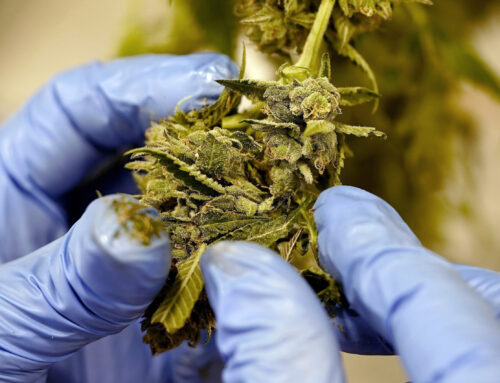Santa Cruz County cannabis lounge policy clears final hurdle
March 28, 2025

SANTA CRUZ — After a lengthy and, at times, contentious discussion this week, Santa Cruz County leaders gave the official go-ahead for on-site cannabis consumption at retail lounges while approving the first step for a similar policy at local farms.
By way of a split 3-2 vote at its meeting Tuesday, the county Board of Supervisors accepted a second read of a new ordinance that gives 11 cannabis retailers in unincorporated Santa Cruz County an opportunity to establish an area where customers can consume the green-leafed product.
A few hours thereafter, the board also approved the first read of another cannabis industry ordinance establishing a three-year pilot program for sales and consumption at local farms as a way to encourage agritourism.
“We’re going to be monitoring this very closely to ensure that we’re having the least amount of impacts on our community as possible,” said Supervisor Justin Cummings, speaking about the farm-specific pilot program. “But (we’re) really wanting to help support many of the businesses here and also have a responsible, well-educated community as it relates to cannabis now that it’s legal.”
While the county has been licensing cannabis retailers since 2014, many in the industry have complained that growth has been stifled by an environment of overregulation from the state. Supervisor Manu Koenig, who has championed both policies for years, voiced a belief that if the county wants to help this industry thrive under local ownership and prevent a corporatized drive-through model from taking over, it has to allow for innovation.
“If we’re going to do that, we need to create opportunities for social use and education,” said Koenig. “We need to allow local entrepreneurs to compete by selling experiences. And as as a tourist-based economy here in Santa Cruz County, we are uniquely positioned to do that.”
The board cleared the way for consumption at brick and mortar stores at its March 11 meeting by approving a first read of the ordinance, with supervisors Kim De Serpa and Monica Martinez voting in opposition — a voting pattern that held during this week’s decisions. While the second and final read of the ordinance is typically put on the board’s debate-free consent agenda, De Serpa pulled the item for discussion Tuesday to once again voice her opposition.
De Serpa’s father was killed by a drunk driver when she was 3 years old and the event thrust her family into a life of poverty. De Serpa shared these memories at Tuesday’s meeting to reemphasize concerns, shared by Martinez, that the new policy will increase the number of intoxicated drivers on local roadways.
De Serpa said her office has been flooded with constituent notes of opposition since the vote earlier this month, while Martinez pointed to testimony from local law enforcement officials that also bristle at the policy shift because there’s no easy way to measure cannabis intoxication levels.
“It’s shocking to me that this board would ever agree to allow people under the influence of cannabis to be on our roads, in our rural areas, in our downtown areas,” said De Serpa. “Putting other people at risk.”
Koenig, after first expressing sympathy for what De Serpa shared, said his office reached out to law enforcement in several jurisdictions across the state that had already legalized consumption lounges to see if the policy had contributed to an increase in traffic violations or accidents. All reported back that it had not.
“If lounges were really as big a problem as folks are suggesting they might be, I would think that at least one of the people we reached out to would have expressed concerns,” said Koenig. “In fact, it was quite the opposite.”
Still, the board did agree that it needed to give enforcement aspects of the ordinance some extra teeth. In addition to approving the policy, the board directed staff to draw up amendments that would allow the county to discipline or revoke permits from a dispensary if it is determined that someone it served in its lounge drove under the influence and consequently caused damages.
The board also instructed its staff to explore funding opportunities that could allow the county to develop educational curriculum for consumption lounges.
Pilot program
The board, with De Serpa and Martinez again voting against, agreed to the first read of the farm-specific lounge and retail sales pilot program.
Cannabis Licensing Manager Sam LoForti explained in a presentation to the board that there are many cannabis farm tour companies operating in the state. They bus visitors to the farm, then to a retailer, then to an outdoor setting for some fresh air. Sometimes, they’ll cap things off with a visit to a restaurant, coffee shop or winery.
“The missing link with these tours is: there’s no safe place to consume,” said LoForti. “These tour companies take people out to beaches, on nature walks, and people are publicly consuming right now. That’s an issue we hope to address with this.”
The pilot program is prohibited on private roads and outlaws any visiting drivers from consuming cannabis products. It had originally limited sales at farms to one-eighth of an ounce to prevent unnecessary competition between farms and traditional retailers, but Koenig pushed his colleagues to scrap those plans after receiving feedback from cannabis industry professionals. Instead, the board reverted to the state purchasing limit of one ounce per visit and attached a reservation system requirement to farm lounge purchases in hopes of slowing down excessive buying.
County staff plan to track the number of total visitors and vehicle trips during the pilot program, along with the sales tax revenue data it’s already been collecting since 2014. It wasn’t immediately clear when the pilot program ordinance was scheduled for a second read, but the board’s next meeting has been set for April 8.
Search
RECENT PRESS RELEASES
Related Post







